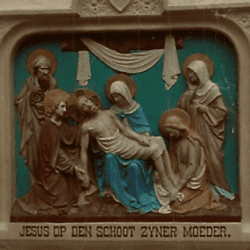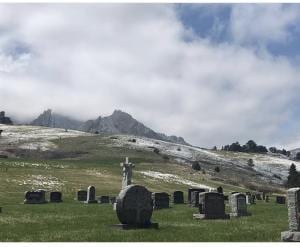 “Children! You’re gonna die! That’s right. You’re gonna die! You don’t think you’re gonna die! You can’t imagine dyin’ right now, but one of these days, they’re gonna take you out to the cemetery, drop you in a hole, throw dirt in your face, and go back to the church and eat potato salad!”
“Children! You’re gonna die! That’s right. You’re gonna die! You don’t think you’re gonna die! You can’t imagine dyin’ right now, but one of these days, they’re gonna take you out to the cemetery, drop you in a hole, throw dirt in your face, and go back to the church and eat potato salad!”
Christian scholar Tony Campolo shares about a long-time tradition on at Mt. Carmel Baptist Church, an African-American congregation in West Philadelphia. Every year, the high school seniors would be presented in front of the church and after they each share about their plans for their futures, the pastor would say those words above.*
As the college students recently reveling at the Florida beaches over spring break remind us, young people tend to be oblivious to the reality of death. They think they’re invincible. They’re in denial of their mortality. But the truth is, we’re all in denial of our mortality. It’s only a matter of degrees, and it’s not many degrees. American society is completely death avoidant. It is the our greatest taboo. We don’t talk about it. We “don’t go there.” Only 42% of Americans say that they have a will in place, and in reality, it’s far less than that. Pondering our eventual demise is the thing we avoid most. It’s been said that “Two things are certain in life – death and taxes” – and we only do the taxes part because we have to once a year – and many outsource it to someone else to do.
“Death is inevitable but a good death is not. In general, we are death illiterate, death phobic, and unprepared for death.. living well, living better, is based on our values, what we find sacred, and how we want to write the chapters of our lives – whether it’s the last chapter, or the last three.” ~ Yagesh Shah, M.D.
 Given the reality of the coronavirus pandemic that is sweeping the world, and particularly the gravely unprepared United States, the odds of any of us dying over the next 12 months have increased significantly. This virus is no respecter of persons. And it isn’t something that only affects the elderly – over 50% of those who are being treated for it are under 50 years of age. Quite a few people who are suffering from it are young and have had no prior adverse health conditions. A 17 year old boy died of it just today. Some are predicting that this will be more lethal than the 1918 flu. Essentially, well over half of the U.S. population will get coronavirus and 15% of them will need hospital treatment, and about 2% of people who contract it will die from it. Because of our nation’s lethargic response to flattening the spread, it is likely that some 140 million Americans +/- will get this – which translates to about 3-4 million deaths – perhaps down to 300,000 if we really take this seriously. By the end of the year, we will each likely know someone who has died of this (or at least it will have happened to a friend or member of the family of someone we know).
Given the reality of the coronavirus pandemic that is sweeping the world, and particularly the gravely unprepared United States, the odds of any of us dying over the next 12 months have increased significantly. This virus is no respecter of persons. And it isn’t something that only affects the elderly – over 50% of those who are being treated for it are under 50 years of age. Quite a few people who are suffering from it are young and have had no prior adverse health conditions. A 17 year old boy died of it just today. Some are predicting that this will be more lethal than the 1918 flu. Essentially, well over half of the U.S. population will get coronavirus and 15% of them will need hospital treatment, and about 2% of people who contract it will die from it. Because of our nation’s lethargic response to flattening the spread, it is likely that some 140 million Americans +/- will get this – which translates to about 3-4 million deaths – perhaps down to 300,000 if we really take this seriously. By the end of the year, we will each likely know someone who has died of this (or at least it will have happened to a friend or member of the family of someone we know).
As a United Methodist pastor who has served in ministry for over 24 years in congregations in Minnesota, Iowa, and Colorado, I’ve had the honor of helping many (hundreds) of grieving families celebrate the death of their loved ones. I loathe generic, cookie-cutter funerals and memorial services so to help me personalize these celebrations of life, I’ve created a document that I send out to family members to help them get a start on what kinds of things they’d like me to know about their loved one. I meet with as many as I can in person, but sending out this form first helps.
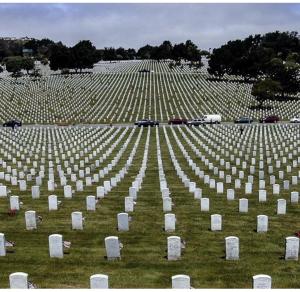 Given that we’re in a time of needed social distancing, many funerals that take place in this country over the next months will need to be done online via the internet. We won’t be able to meet in person. So, all the more reason to help personalize things as best we can. This will likely also mean a dramatic rise in the number of cremations and interment in columbariums – people shouldn’t gather as pallbearers to carry heavy caskets to graves (too close together).
Given that we’re in a time of needed social distancing, many funerals that take place in this country over the next months will need to be done online via the internet. We won’t be able to meet in person. So, all the more reason to help personalize things as best we can. This will likely also mean a dramatic rise in the number of cremations and interment in columbariums – people shouldn’t gather as pallbearers to carry heavy caskets to graves (too close together).
Also, during the season of Lent (the weeks of preparation prior to the celebration of Jesus’ resurrection on Easter Sunday), I’ve had a tradition of inviting members of the congregations I’ve served to ponder their mortality by filling out a form I created that conveys how they wish to be remembered. Essentially, writing their own obituary. (skip to the bottom if you aren’t into reading forms ; )
Writing Your Obituary
Writing your obituary at this time in your life may seem like a strange activity. Why this somber task? Why write about that which most of us wish to avoid, postpone, or deny? Answer: Because we avoid, postpone, and deny it. If nothing else, it will be worth your energy to do this simply as a values clarification exercise. Availing yourself to this opportunity may aid in helping you be more clear and in touch with what it is you wish to do with what’s rest of your life. Where is it that you want your life to count? What is your purpose? What is your mission? What are you called to do in this lifetime? At present, can you identify gifts and abilities that give you confidence and a sense of well-being? What is it about what you offer that others notice and value? What do you want to be proud of? What do you wish to be your legacy? Let’s proceed.
1. _________________ died today at the age of _____________
2. S/he/they is survived by the following loved ones and family members ___________
3. S/he/they will be remembered by the following groups and communities ________
4. Mr/Ms. _________ was noted for ______
5. S/he was the type of person who _____
6. His/her/their significant accomplishments were _______
7. At the time of death s/he/they was deeply engaged in _______
8. Some of his/her passions/fascinations/obsessions included _______________
9. S/he wasn’t perfect and wanted their friends and family to know ______________
10. S/he/they will be remembered for his/her/their ____________
What do you make of your obituary? By and large, do you feel satisfied with the way your life is going? Outline the changes you wish to make, things that will better prepare you for your goals, expand your possibilities, and utilize your gifts and resources.
Please consider providing a copy of your completed form to your family members and the pastoral staff of your congregations. Keep in mind you won’t have say in what your obituary will actually say. That’s a task for your loved ones, but this will greatly assist them!
~~~
Another thing that we can be doing with this increased down time in (many) of our lives is to use make a video recording selfie legacy that we can store on our computers and save up to the cloud so that loved ones can access after we die. You can use a camera phone or an online service. Try to have it be less than 30 minutes. Ensure you have good lighting. Speak clearly and not too quickly. But just be yourself. Share words you’d want your loved ones to hear from you beyond the grave. Words of blessing, some humor, apology and request for forgiveness, sharing how proud you are about them, words of hope, comfort, and inspiration.
~~~
Similarly, I created another resource to help people who’ve had a loved one die to help share about that person to help a pastor or priest better know about that person. Filing out this form after someone dies can also help you to grieve their loss by really remembering them.
Celebrating & Remembering Your Loved One’s Life
What were some of his/her/their (henceforth “Pat”) favorite hobbies/interests/books/music, etc.?
What did s/he/they like most about school? What were Pat’s favorite subjects? What were Pat’s least favorite?
What were some of Pat’s convictions/beliefs/opinions about the world, society, politics, religion, etc.? (if any)
What were some of Pat’s hopes and dreams for the future?
What were some things about Pat that you valued and appreciated the most?
What was unique about Pat? What was it about Pat that made Pat “Pat”? (personality, humor, intelligence, wit, quirks, eccentricities, moods, etc.)
What were some of the things that Pat always used to say? e.g. was Pat known for having any favorite expressions or sayings? For instance, one of my buddies always says “It ain’t nothin’ but a battered up chicken wing!” whenever he runs into an unexpected problem; another pal says “Curiouser and curiouser” (quoting Lewis Carroll’s Alice in Wonderland) whenever he comes across something strange in the news; another buddy is known for saying “It’s all good!” whenever people are feeling frustrated by a petty problem; and one of my aunts always said “Well how ‘bout that!” whenever she heard something new or interesting – that kind of thing.
What are some of your favorite memories of things that you did together with Pat?
What were one or two funny/embarrassing moments that Pat had?
What things made Pat happy? What made Pat laugh?
How did Pat convey love?
How did Pat like to be loved?
What do you think that Pat’s friends will remember most about Pat?
What are some things you think most people might not have known about Pat?
Again, I am so sorry about your loss. Pat sounds like s/he/they was a unique and wonderful individual – even with his/her/their flaws. I’m sure that you’re being overwhelmed by all sorts of feelings at this time; sorrow, relief, depression, anger (maybe even at God), etc. and this is all normal and healthy.
Grief is never easy to go through, but it helps to know that having all of these feelings is normal. There’s usually a time of shock (“I can’t believe it! This is so unexpected and tragic, and it has caught me so much by surprise that I don’t know just what to think/feel/or do!), a time of denial (“this isn’t really happening”); anger (Damn it! Why did you let this happen God!?”); depression (that one is obvious); and, in time, acceptance and hope (Okay, this really did happen, it really does suck, it really does hurt, and, with God’s help and the support of my loved ones, I really can move on in life).
The other thing to remember is that the process and journey of grief isn’t a quick thing with a set timeline. Various members of the family could be in the anger or denial stages for many weeks or months, some stages will be shorter than others, and you’ll all still feel twinges of loss and pain even years from now – though things really do get better with the passage of time. Be patient, gentle and gracious toward each other.
My main advice for you is to let yourselves be real before your family, your friends, and God. There’s no use pretending to “be all right” when you’re not. One of the beauties about being a person of faith is that we know that 1) there is more to our life than the existence we know now on earth; and 2) we’re in good company when we feel anger toward God from time to time and that it’s okay.
Let your family, church, and friends love you at this time, and be sure to share the love you have with them. This sharing of love is how God is being present with you all and providing the healing and grace that it is needed. This is a time to celebrate the gift of having Pat in your life for as long as you did.
~~~
 Finally, the following are other IMPORTANT THINGS we can all be doing to help make things easier for our friends and loved ones when we die:
Finally, the following are other IMPORTANT THINGS we can all be doing to help make things easier for our friends and loved ones when we die:
* Log onto Facebook, etc., and state the person(s) who you wish to a “legacy contact” to be in charge of your account when you die. Learn how to have someone memorialize your account, or for you to do that for a loved one, etc.
* List all of your banking, email, and social media login usernames and passwords in a safe place for a loved one(s) to have access to when you die. Perhaps online (see link), on paper or a thumb/flash-drive in a safety deposit box in your bank, a safe in your home, or in an email to a trusted friend, etc.
* Tidy up and organize your financial records: taxes, utility bills, credit cards, debit cards, checking accounts, insurance policies, pensions, IRAs, etc. so that it’ll be easier for family members to find and make sense of.
* Become an organ donor.
* Write up a living will/advance directive to help your loved ones know your wishes for your health care wishes at various points in your life (ages) and possible situations, e.g. “pull the plug if I’m not out of a coma within 6 months”, etc. May need to be signed and notarized, depending upon which state you live in. Be sure to have those on file at the hospitals you are likely to be brought to in an emergency. Designate someone to serve as your power of attorney if you become incapacitated.
* And, contact an estate attorney and set up an actual will so you and state what you intend to do with whatever finances, estate, and assets you have. Designations to charity, particular items to certain people, etc. Be sure to set up who you wish to have power of attorney as part of this.
* Moreover, this sort of situation reminds us of the need to try to reconcile with people we are be estranged with. Most all of us have one or two such people. This is a good time to try. Grace happens. This is a time to love people – and say it.
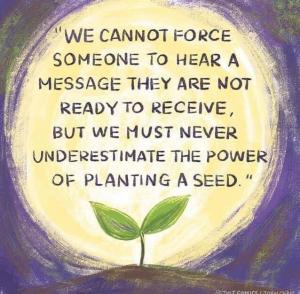 Friends, I don’t like being so blunt. But sometimes that is what is needed. It’s been said that pastors are called to “comfort the afflicted and to afflict the comfortable.” My last blog offered a way to experience calm amidst this scary storm through contemplative spiritual practice. If we find ourselves on our backs with or without a ventilator gasping our last breaths – that practice will be really helpful. Today’s focus is on down to earth matters – practical ministry. May these suggestions, even if they afflict you, be a blessing to you and many.
Friends, I don’t like being so blunt. But sometimes that is what is needed. It’s been said that pastors are called to “comfort the afflicted and to afflict the comfortable.” My last blog offered a way to experience calm amidst this scary storm through contemplative spiritual practice. If we find ourselves on our backs with or without a ventilator gasping our last breaths – that practice will be really helpful. Today’s focus is on down to earth matters – practical ministry. May these suggestions, even if they afflict you, be a blessing to you and many.
* (p. 165, Stories that Feed Your Soul)
UPDATE: When I first wrote this article, I couldn’t locate another form that I created back in 1996 for Delano UMC: “Suggestions for My Funeral/Memorial Service”
Date Name Phone Address
To: Pastor Delano UMC, Delano, MN I would appreciate your keeping the following information on file at the church and referring to it at the time of my death. I intend that this paper be considered apart from and in no way related to any legal document I have or shall have prepared. I have completed this form to help my loved ones celebrate my life in their rituals of farewell, mourning, and thanksgiving.
1. Care of My Remains Embalming ___ Restoration ___ Reviewal ___ Cremation ___ Other ____
2. I prefer the Funeral Director to be ___
3. I prefer that the service of worship in celebration of my life be held as:
__ Service in church building
__ Committal service at graveside or cemetery
__ Both of the above
__ a post-burial/crematory Memorial service in church facility.
__ committal service at funeral home or grave site With a memorial service held later at the church facility
__ other
4. Disposition of my remains
__ Burial Cemetery preference ___ Registered name ___
__ Cremation .. Ashes handled as follows: ____
__ Bequest (donation, e.g., eyes, kidneys, heart, etc. Name of hospital/institution receiving organs ____
__ Body donated to science. Name of research university ___
5. I prefer that any memorial gifts take the form of:
__ Gifts to Delano UMC church budget
__ Specifically designated donations toward specific materials or ministries
__ Gift to the Minnesota Annual Conference of the UMC
__ Flowers (kinds?)
__ Gifts to these charities:
6. Special requests for the service of celebration
Congregational Hymns: ___
Special Music ____ Suggested scriptures ____
Other requests ___
7. My will: __ includes the above decisions ___ Have not made a will
I understand that this document is not binding on any party and that the preferences I have stated here will be honored in a loving spirit as circumstances and reason allow. Signed ______
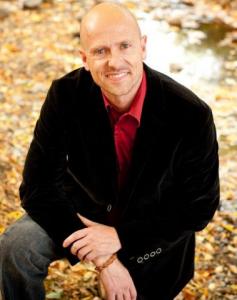 Rev. Roger Wolsey is a certified Spiritual Director, United Methodist pastor, and author of Kissing Fish: christianity for people who don’t like christianity
Rev. Roger Wolsey is a certified Spiritual Director, United Methodist pastor, and author of Kissing Fish: christianity for people who don’t like christianity
Click here for the Kissing Fish Facebook page
Roger’s other blogs on Patheos
** If you would like to become a patron of Roger’s work as a spiritual writer, please click Here to learn more.










